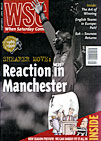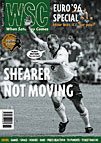 Olympic football is becoming increasingly important. Matthew Brown reports
Olympic football is becoming increasingly important. Matthew Brown reports
When the final score of the first women’s Olympic football final was flashed up on the stadium scoreboard in giant golden letters just minutes before Michael Johnson’s medal ceremony, the crowd roar almost rivalled the one which erupted when Johnson flashed through the 200 metres finish line earlier in the evening. The world’s most popular sport has had a strange, and sometimes strained, relationship with the world’s biggest sporting event, just as it has with the world’s most powerful nation. Until now. In Atlanta, Olympic football may, just possibly, have become an international competition significant enough to bridge the yawning gap between World Cup Finals.
